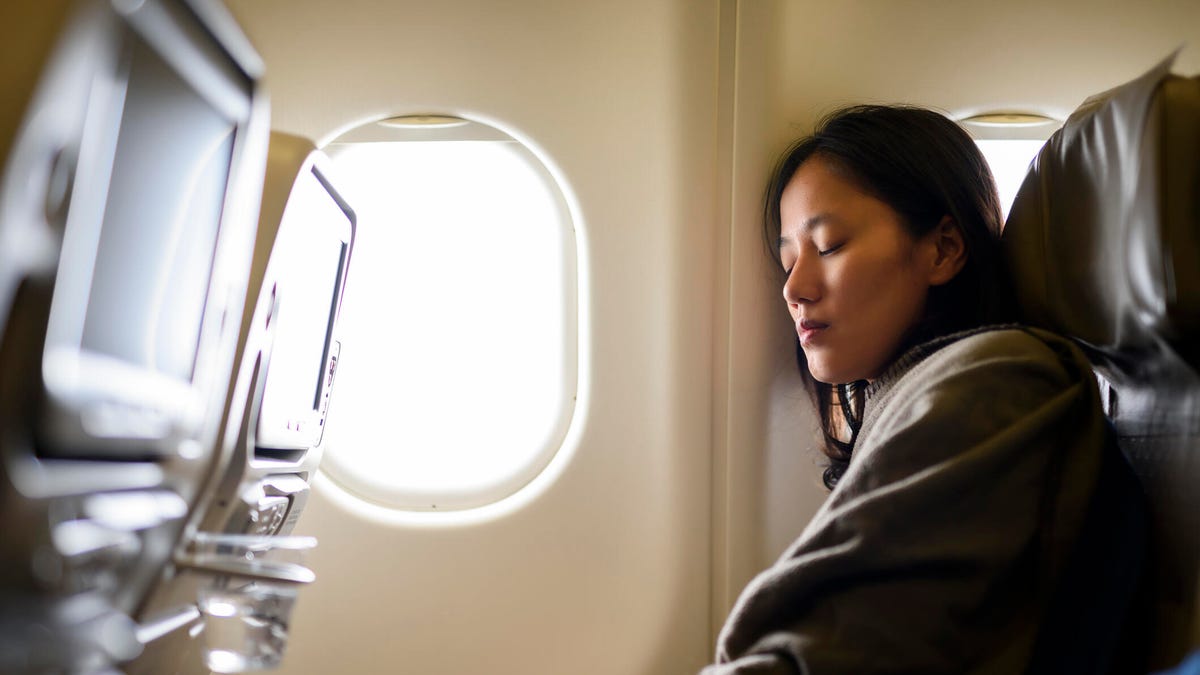
Over the holidays, 115 million people in the US are expected to travel. For those people, a good night’s sleep is essential but can be hard to get. Whether you’re traveling by car, train, bus, boat or plane, sleeping in an environment you have no control over and potentially crossing time zones (ugh, jet lag) can wreak havoc on your sleep, leaving you fatigued and not in a happy holiday mood.
Since sleep is an important component of both your physical and mental well-being, you’ll want to make an effort to get rest even when traveling to visit loved ones over the holidays. To help, we’ve compiled some expert tips to help you get some Zs so you’re ready to celebrate the season.
Read more: CNET’s Best Pillows
Why do we feel tired after traveling?
Travel fatigue is the physical manifestation of travel grievances. It can happen in the event of things like having anxiety about flying on a plane, stress from planning, long layovers, delayed flights or lack of sleep during travel. Although you’re mentally drained, travel fatigue can make it more difficult to get restful sleep.
Why would someone be tired after a trip abroad?
Aside from travel fatigue, jet lag during travel can also make it a struggle to achieve quality sleep. Jet lag is a temporary sleeping disorder that develops when you cross time zones, and your body is thrown out of whack from its regular sleep-wake cycle.
Our body heavily depends on outside factors like sundown, sunrise and eating times to regulate the release of melatonin. As a result, your body has a difficult time readjusting during travel, leaving you feeling tired and having difficulty concentrating.
How to sleep better while traveling
Combat travel fatigue, jet lag and uncomfortable sleeping circumstances by following these tips.
Prepare your body for the new schedule
Starting three days before you go, set your bedtime an hour later (depending on the time zone of where you’re traveling) each day. This will help your body become accustomed to the new time change that you’ll be experiencing in a few days, and allow you to fall asleep at a reasonable time when you’re away.
An exception to this rule: If you expect to be gone across time zones for only two days, stick to your regular sleeping schedule. By the time you adjust to the new time, you’ll be getting ready to head back home.
Do as the locals do
Once you arrive at your destination, try to sync up to their schedule. When people are awake in the morning and going about their daily lives, you should be, too. When the people around you are gearing up for bed, you should be about ready to sleep, as well. Unless your stay is two days long, this will help your body readjust even if it means you’ll be half-asleep at dinner.
Pack comfy
Pack your comfiest clothes for travel and a good quality pillow to sleep with if you can fit it inside your suitcase. Loose-fitting fabrics can help you feel comfortable while you travel long distances, which is key if you’re hoping to get some sleep while on the road.
A pillow can also make it easier to fall asleep. Bring a standard pillow for the back seat of a car or a C-shaped pillow to wrap around your neck while on a plane or train.
If you have to stay awake, keep moving
Like light, body temperature also plays an important role in regulating our sleep-wake cycles. If your body is higher in temperature, it’s a signal that it’s time to be awake. It’s a reason why hot sleepers can have trouble getting quality sleep if they’re too warm. By keeping your body in motion and your heart rate up, you can help fight the grogginess and fatigue that accompany travel.
Eat nutritiously and drink water
Staying hydrated and eating well while traveling not only will help you remain fueled up for different stages of travel but will also keep you from feeling hungry or thirsty if you want to doze off on the plane or in the car.
Use light to your advantage
The sun is a signal to our circadian rhythm that it’s time to be awake, and the night tells us it’s time for sleep.
If you travel from west to east, the best times of day to get light exposure are the late morning and late afternoon. That way, you stay awake and vigilant during the day, but you give your body the chance to wind down into the nighttime. If you travel from west to east, remain in the sun into the evening to help adjust to the new time.
Read more: How to Cope With Seasonal Affective Disorder
Avoid alcohol on your first day
Hear me out. As fun as it is to get a drink on the airplane on the way to your destination or at dinner when you arrive, alcohol messes with your sleep-wake cycle. This is something you want to avoid during your first day of getting acclimated to the new time.
Avoid caffeine and nicotine
Caffeine and nicotine are stimulants that will make your body feel like it wants to be awake. Caffeine can stay in your system for up to five to six hours, making you feel wired when you should be winding down for bed. Nicotine, on the other hand, causes cravings and has no time limit. That means you can be laying awake in bed feeling tired, but your body stays awake wanting more nicotine.
Use natural sleep aids
Melatonin is always an option, but I’m always wary of recommending it because it can mess with your body’s natural production of melatonin. As an alternative, consider using natural sleep aids to help you fall asleep at night like herbal tea or CBD oil.
link





